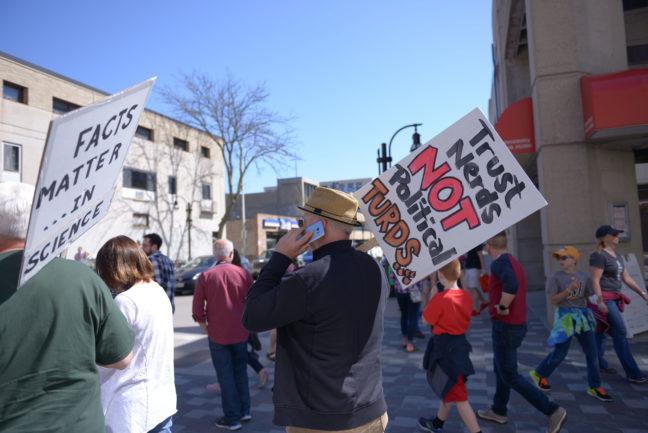In an effort to mitigate the effects of climate change in Dane County, Dane County Executive Joe Parisi hired the county’s first director of the new Office of Energy and Climate Change, Keith Reopelle.
With a master’s degree in environmental communications and more than 30 years of experience working with environmental advocacy groups, committees, task forces and, most recently, county-level focus on clean energy and climate change, Reopelle said he is ready to take on his new role.
“Climate change is the most pressing environmental issue right now, there is a lot that needs to be done,” Reopelle said.
He said the position is a result of Parisi’s leadership in environmental protection and support of the state legislature.
Both entities have shown “strong support” for environmental protection and eco-friendly solutions, he said.
“The focus now is making changes to the whole county. It was the natural next step to create the office,” Reopelle said.
As director, Reopelle will lead The Council on Climate Change, created through Parisi’s 2017 budget plan, which he hopes will work toward fulfilling the goal of the Climate Action Plan for Dane County and reduce the carbon footprint of Dane County departments.
The Climate Action Plan is an external of Dane County’s own departments, and will be implemented in fall 2018, Reopelle said. The plan hopes to have the county switched over to renewable energy by 2050.
“Essentially, this comprehensive action plan will consists of policies, programs and projects that will aim to reduce the emissions of greenhouse gasses by Dane County homes, businesses, farms, etc.” Reopelle said. “We expect this plan will put Dane County as a state and nation wide leader in climate change.”
As a leader in agriculture and crop production, increasingly prominent scene for new businesses, and home to the second largest population of any county in the state as well as 936 acres of University of Wisconsin campus, the Office of Energy and Climate Change is especially important for Madison and Dane County, Reopelle said.
The implementation of the Office of Energy and Climate Change is necessary now more than ever, Reopelle said. Dane County and the state of Wisconsin have felt the impact of climate change in more ways than one, between torrential rainfall in the spring, unpredictable winters, drought and intense summer heat.
“There are significant greenhouse emissions here, and it is time we demonstrate leadership and help other units of local government in solving this problem,” Reopelle said. “We have the resources to do so.”
Climate change is also affecting the health of Wisconsinites, Reopelle said. With hotter summers comes a rise in smog and air pollutants that makes breathing harder for young children and the elderly. The heat also puts stress on people and livestock.
UW will play a crucial role in helping fight climate change in Dane County, Reopelle said. As one of the largest energy users in Dane County, building eco-friendly facilities, installing solar panels and offering energy and environmentally efficient alternatives will greatly help the efforts of the Office of Energy and Climate Change.
“We will not achieve our goals if UW does not become more aggressive in its approach to preventing climate change,” Reopelle said. “There is a lot of room for improvement.”
Making Dane County a more sustainable place to live will be possible through the new office, programs, policies and support from the state government and community, Reopelle hopes.
The measures that Dane County is taking to mitigate the effects of climate change will hopefully evoke an increase in jobs and economic activity for all those living in the community regardless of their status, Reopelle said. Despite climate change, Dane County will be resilient.
“Dane County will be more resilient, as unfortunately, climate change is bound to happen,” Reopelle said. “These solutions and benefits [to climate change] need to be available to everybody regardless of economic status or race.”


